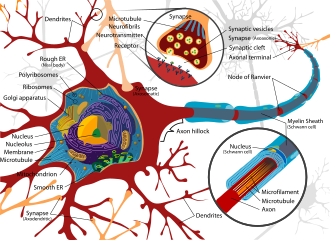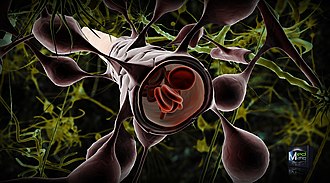Neurotoxin





Neurotoxin refers to a broad class of toxins that specifically cause damage to the nervous system. These substances can originate from a variety of sources, including plants, animals, bacteria, and synthetic compounds. Neurotoxins can disrupt the normal function of nerve cells, leading to a wide range of effects, from mild symptoms such as numbness or tingling, to severe outcomes like paralysis or even death. The mechanism of action, symptoms, and treatment can vary significantly depending on the specific neurotoxin involved.
Sources and Types[edit]
Neurotoxins can be classified based on their source. Some notable examples include:
- Botulinum toxin: Produced by the bacterium Clostridium botulinum, this is one of the most potent neurotoxins known. It can cause botulism, a serious illness leading to paralysis.
- Tetrodotoxin: Found in pufferfish and some other marine species, this neurotoxin can block sodium channels in nerve cells, preventing nerve impulse transmission.
- Venoms: Many animals, such as snakes, spiders, and scorpions, produce neurotoxic venoms that can incapacitate or kill their prey or predators.
- Alkaloids: Certain plants produce neurotoxic alkaloids, such as atropine from deadly nightshade, which can interfere with neurotransmitter function.
Mechanism of Action[edit]
The mechanism of action of neurotoxins can vary widely. Some common mechanisms include:
- Interference with neurotransmitter release or uptake, as seen with botulinum toxin.
- Blocking or activating specific ion channels in the nerve cell membrane, which can alter the electrical excitability of the cells.
- Direct damage to nerve cell structures, leading to cell death.
Symptoms and Effects[edit]
Symptoms of neurotoxin exposure can range from mild to severe and depend on the type of neurotoxin, the amount of exposure, and the individual's susceptibility. Common symptoms include:
- Muscle weakness or paralysis
- Numbness or tingling sensations
- Difficulty breathing
- Impaired vision
- Confusion or altered mental status
In severe cases, exposure to neurotoxins can lead to life-threatening conditions such as respiratory failure or cardiac arrest.
Treatment[edit]
Treatment for neurotoxin exposure varies depending on the toxin involved. It may include:
- Administration of antitoxins or antivenoms to neutralize the toxin.
- Supportive care, such as mechanical ventilation for respiratory failure.
- Medications to manage symptoms, such as anticholinergics for some plant toxins.
Preventive measures, such as avoiding contact with known sources of neurotoxins and using protective equipment when necessary, are also important.
Conclusion[edit]
Neurotoxins represent a significant risk to health due to their potential to cause serious damage to the nervous system. Understanding the sources, mechanisms of action, and treatments for neurotoxin exposure is crucial for managing and preventing these risks.
Ad. Transform your life with W8MD's Budget GLP-1 injections from $75


W8MD offers a medical weight loss program to lose weight in Philadelphia. Our physician-supervised medical weight loss provides:
- Weight loss injections in NYC (generic and brand names):
- Zepbound / Mounjaro, Wegovy / Ozempic, Saxenda
- Most insurances accepted or discounted self-pay rates. We will obtain insurance prior authorizations if needed.
- Generic GLP1 weight loss injections from $75 for the starting dose.
- Also offer prescription weight loss medications including Phentermine, Qsymia, Diethylpropion, Contrave etc.
NYC weight loss doctor appointmentsNYC weight loss doctor appointments
Start your NYC weight loss journey today at our NYC medical weight loss and Philadelphia medical weight loss clinics.
- Call 718-946-5500 to lose weight in NYC or for medical weight loss in Philadelphia 215-676-2334.
- Tags:NYC medical weight loss, Philadelphia lose weight Zepbound NYC, Budget GLP1 weight loss injections, Wegovy Philadelphia, Wegovy NYC, Philadelphia medical weight loss, Brookly weight loss and Wegovy NYC
|
WikiMD's Wellness Encyclopedia |
| Let Food Be Thy Medicine Medicine Thy Food - Hippocrates |
Medical Disclaimer: WikiMD is not a substitute for professional medical advice. The information on WikiMD is provided as an information resource only, may be incorrect, outdated or misleading, and is not to be used or relied on for any diagnostic or treatment purposes. Please consult your health care provider before making any healthcare decisions or for guidance about a specific medical condition. WikiMD expressly disclaims responsibility, and shall have no liability, for any damages, loss, injury, or liability whatsoever suffered as a result of your reliance on the information contained in this site. By visiting this site you agree to the foregoing terms and conditions, which may from time to time be changed or supplemented by WikiMD. If you do not agree to the foregoing terms and conditions, you should not enter or use this site. See full disclaimer.
Credits:Most images are courtesy of Wikimedia commons, and templates, categories Wikipedia, licensed under CC BY SA or similar.
Translate this page: - East Asian
中文,
日本,
한국어,
South Asian
हिन्दी,
தமிழ்,
తెలుగు,
Urdu,
ಕನ್ನಡ,
Southeast Asian
Indonesian,
Vietnamese,
Thai,
မြန်မာဘာသာ,
বাংলা
European
español,
Deutsch,
français,
Greek,
português do Brasil,
polski,
română,
русский,
Nederlands,
norsk,
svenska,
suomi,
Italian
Middle Eastern & African
عربى,
Turkish,
Persian,
Hebrew,
Afrikaans,
isiZulu,
Kiswahili,
Other
Bulgarian,
Hungarian,
Czech,
Swedish,
മലയാളം,
मराठी,
ਪੰਜਾਬੀ,
ગુજરાતી,
Portuguese,
Ukrainian
